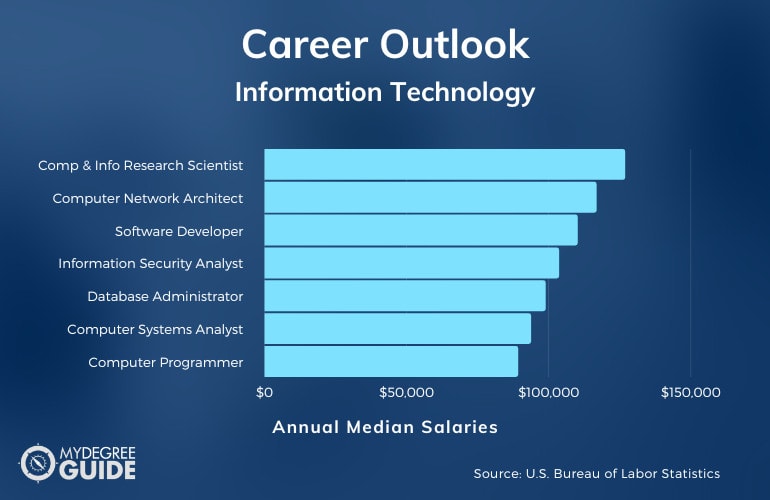Explore online masters in information technology programs for 2024. Compare IT degrees, technology career paths, and salaries.

An online masters in information technology can bring you deeper into the growing, evolving tech sector.
This is an interesting degree option with a lot of range because of the way the tech sector now reaches into every sector. An advanced degree in IT is a great option for sharpening your skills, learning new tech concepts, and exploring theories of IT management.
Editorial Listing ShortCode:
It can also be important if you’d like to apply the skills you have within a leadership position.
Universities Offering Online Information Technology Master’s Degree Programs
Methodology: The following school list is in alphabetical order. To be included, a college or university must be regionally accredited and offer degree programs online or in a hybrid format.
1. Arizona State University
Established in 1885, Arizona State University is a public university with five campuses spanning the Phoenix metro area. Enrollment over 100,000 makes it one of the country’s largest public universities. Bachelor’s, master’s, and doctorate degrees are offered across 400 graduate degree and certificate programs.
- MS in Information Technology
Arizona State University is accredited by the Higher Learning Commission of the North Central Association of Schools and Colleges.
2. Colorado Technical University
Colorado Technical University in Colorado Springs, Colorado, offers undergraduate, graduate, and doctoral degrees in the fields of tech, business, and management. Founded in 1965, CTU’s current enrollment numbers are 23,094 undergraduate students and 2,703 graduate students.
- MS in Information Technology
Colorado Technical University is accredited by the Higher Learning Commission.
3. Concordia University – St Paul
Concordia University, St. Paul in Saint Paul, Minnesota, has a total enrollment of 5,000 students. This school with a history dating back to 1893 offers undergraduate programs, graduate programs, adult undergraduate degree programs, continuing classes and licensures.
- MS in Information Technology Management
Concordia University-Saint Paul is accredited by The Higher Learning Commission.
4. Florida State University
Founded in 1851, cutting-edge Florida State University in Tallahassee, Florida, is a public space-grant and sea-grant research university. Bachelor’s, master’s, and doctorate degrees are offered in a research-focused setting.
- MS in Information Technology
Florida State University is accredited by the Southern Association of Colleges and Schools Commission on Colleges.
5. Florida Tech
The Florida Institute of Technology (Florida Tech) is a private university in Melbourne, Florida, offering bachelor’s, master’s, and doctorate programs. Nearly half of all Florida Tech students are enrolled in its School of Engineering. It was founded in 1958.
- MS in Information Technology
Florida Tech is accredited by the Southern Association of Colleges and Schools.
6. George Mason University
Located near Fairfax, Virginia, George Mason University is a public research university offering degree programs at the bachelor’s, master’s, and doctoral levels. The school has expanded to a student enrollment of 38,255 since its founding in 1949.
- MS in Applied Information Technology – Cyber Security
George Mason University is accredited by the Commission on Colleges of the Southern Association of Colleges and Schools.
7. Illinois Institute of Technology
Chicago’s Illinois Institute of Technology is a private university with a student enrollment of 7,266 that traces its history back to 1890. The school offers bachelor’s, master’s, and doctoral degrees with tech-integrated curricula.
- Master of Information Technology and Management
Illinois Institute of Technology is accredited by the Higher Learning Commission.
8. Kennesaw State University
Situated in Kennesaw, Georgia, Kennesaw State University is a public university offering bachelor’s, master’s, and doctorate degree programs. The school was founded in 1963 as part of the great economic expansion of Georgia.
- MS in Information Technology
Kennesaw State University is accredited by the Southern Association of Colleges and Schools Commission on Colleges.
9. Lawrence Technological University
Lawrence Technological University (Lawrence Tech) in Southfield, Michigan, is a private university founded in 1932. The school offers a variety of bachelor’s, master’s, and doctoral programs in the fields of science, technology, engineering, arts, and math.
- MS in Information Technology
Lawrence Technological University is accredited by the Higher Learning Commission.
10. Loyola University – Chicago
Loyola University Chicago is a private Catholic research university located in Chicago, Illinois. It was founded by the Jesuits in 1870. Students can pursue a variety of bachelor’s, master’s, and doctoral programs.
- MS in Information Technology
Loyola University – Chicago is accredited by the Higher Learning Commission.
11. Montclair State University
New Jersey’s Montclair State University is a public research university offering bachelor’s, master’s, and doctoral programs in Montclair. Students can choose from more than 300 majors and concentrations. The school has an enrollment totaling 21,115 students.
- MS in Information Technology
Montclair State University is accredited by the Middle States Commission on Higher Education.
12. Purdue University
Founded by businessman John Purdue in 1869, Purdue University is a public research university located in West Lafayette, Indiana. The school is known for facilitating discoveries in the areas of math, science, technology, and engineering.
Students can pursue bachelor’s, master’s, and doctoral degrees in a variety of liberal arts and technical majors.
- MS in Information Technology
Purdue University is accredited by The Higher Learning Commission.
13. Regis University
Regis University is a private Jesuit university founded in 1877 in Denver, Colorado. It offers bachelor’s, master’s, and doctoral programs in health professions, liberal arts, computer science, and business. Enrollment is 8,368.
- MS in Information Technology Management
Regis University is accredited by the Higher Learning Commission.
14. Southern New Hampshire University
Southern New Hampshire University is a private university located in Manchester, New Hampshire that was founded in 1932. The school is one of few with a policy for open enrollment.
Students can pursue bachelor’s, master’s, and doctorate degrees within the university’s Engineering, Technology and Aeronautics (CETA) program, College of Online and Continuing Education (COCE), School of Arts and Sciences, School of Business, and School of Education.
- MS in Information Technology
Southern New Hampshire University is accredited by the New England Commission of Higher Education.
15. Towson University
Towson University is a public university located in Towson, Maryland, with an enrollment of more than 20,000. Founded in 1866, the school offers bachelor’s, master’s, and doctoral degrees across its eight colleges. Towson graduates the most teachers of any Maryland university.
- MS in Applied Information Technology
Towson University is accredited by the Middle States Commission on Higher Education.
16. Tulane University
Founded in 1824, Tulane University is a private research university located in New Orleans, Louisiana. Originally a medical college, Tulane now offers bachelor’s, master’s, and doctoral degrees across a variety of disciplines. Enrollment is 14,062.
- MPS in Information Technology Management
Tulane University is accredited by the Southern Association of Colleges and Schools Commission on Colleges.
17. University of Cincinnati
The University of Cincinnati in Cincinnati, Ohio, is the state’s oldest institution of higher learning. It has grown to an enrollment of more than 44,000 students since its founding in 1819. Students can study in bachelor’s, master’s, and doctoral programs.
- MS in Information Technology
The University of Cincinnati is accredited by the Higher Learning Commission.
18. University of Maryland Global Campus
Established in 1947, the University of Maryland Global Campus is an online public university with headquarters in Adelphi, Maryland. Enrollment totals nearly 60,000 students. The school offers bachelor’s, master’s, and doctoral degrees.
- Master’s in Information Technology
UMGC is accredited by the Middle States Commission on Higher Education.
19. University of Massachusetts – Lowell
Situated in Lowell, Massachusetts, the University of Massachusetts Lowell is a public research university that is part of the University of Massachusetts system. It offers bachelor’s, master’s, and doctoral degrees.
It is one of the country’s only public universities to offer accredited degrees in meteorology, sound recording, nuclear engineering, and plastics engineering. The school was founded in 1894.
- MS in Information Technology
The University of Massachusetts Lowell is accredited by the New England Commission of Higher Education.
20. University of North Carolina – Greensboro
The University of North Carolina at Greensboro is a public research university with a campus in Greensboro, North Carolina. The school is part of the University of North Carolina system. Founded in 1956, it offers bachelor’s, master’s, and doctoral degrees.
- MS in Information Technology and Management
UNCG is accredited by the Southern Association of Colleges and Schools Commission on Colleges.
21. University of South Florida
Founded in 1856, the University of South Florida in Tampa is part of the State University System of Florida. The school has an enrollment of more than 50,000. Bachelor’s, master’s, and doctoral programs are offered.
- MS in Information Technology
USF is accredited by the Southern Association of Colleges and Schools’ Commission on Colleges.
22. University of Texas – Dallas
The University of Texas at Dallas is a research university with a main campus in Richardson, Texas. The school was founded in 1961. It offers bachelor’s, master’s, and doctorate degrees.
- MS in Information Technology and Management
The University of Texas at Dallas is accredited by the Southern Association of Colleges and Schools Commission on Colleges.
23. Virginia Tech
Founded in 1872, Virginia Tech is a research university located in Blacksburg, Virginia. The school offers bachelor’s, master’s, and doctoral degrees. It is one of six senior military colleges in the United States.
- Master of Information Technology
Virginia Tech is accredited by the Southern Association of Colleges and Schools Commission on Colleges.
24. Walden University
Headquartered in Minneapolis, Minnesota, Walden University is an online school that offers bachelor’s, master’s, and doctorate degrees in the fields of public health, education, philosophy, and business administration. The school was founded in 1970.
- MS in Information Technology
Walden is accredited by The Higher Learning Commission.
25. Western Governors University
Western Governors University is a private online university with headquarters in Salt Lake City, Utah. The school offers bachelor’s and master’s degrees. It was founded in 1997.
- MS in Information Technology Management
Western Governors University is accredited by the Northwest Commission on Colleges and Universities.
Online Masters in Information Technology Degrees
There’s some variety when it comes to selecting a path for your IT masters degree. The changing digital landscape means that new specialties are emerging.
Click on the field that most interests you to jump to that section of the guide:
Being at the forefront of one of these specialties can take you to some very interesting places in your career!
Information Technology

A classic masters degree online in information technology can help you gain general expertise in your field. This degree is often a precursor to a role as an IT director.
Editorial Listing ShortCode:
You might handle everything from designing networks to overseeing security protocols for an enterprise.
Cyber Security

A specialty in cyber security can put you in the position of designing and maintaining a strategic line of defense against cyber criminals. This is the ultimate career role for a “problem solver” who enjoys using high-level concepts to stay one step ahead!
Editorial Listing ShortCode:
A degree program focused on cyber security can train you in threat detection and neutralization.
Digital Forensics

By training to be a professional in the field of digital forensics, you can work toward becoming an expert at applying concepts of forensic science to recovering information from digital devices. These experts are often utilized by police departments, government organizations, and investigators.
Editorial Listing ShortCode:
This specialty requires people to wear the hat of the detective, scientist, and tech expert!
Health Informatics

Health informatics is a specialty focused on designing and supporting technology used in health information systems. This specialty has a lot of room for growth as medical records become more widely digitized.
Editorial Listing ShortCode:
This role combines organizational programming with security because people in this profession are tasked with designing user-friendly systems that contain highly sensitive and confidential information.
Information Systems Security

Information systems security is a unique strain within the IT field because its emphasis is mainly on protecting hardware and networks that are part of user interfaces.
Editorial Listing ShortCode:
As a systems expert, you may be responsible for keeping all digital enterprise collateral secure and operating at a company, agency, or organization.
Network Management

Are you interested in being the person who powers and maintains that “invisible engine” that keeps servers, email, websites, and messaging platforms running? Focusing on network management when pursuing your IT masters degree can teach you how to be the person who keeps every careful chess piece of a network in the perfect configuration.
Editorial Listing ShortCode:
Students in this concentration learn how to manage network performance and achieve error-free performance.
Information Technology Careers & Salaries

IT professionals don’t necessarily just work at IT firms and tech companies. Consumer brands, manufacturing companies, media companies, hospitals, government agencies, and schools all need tech experts.
We can look at masters in information technology salary information to get a glimpse at just how valued professionals with this designation are in today’s workforce. According to the Bureau of Labor Statistics, the median pay for computer and information systems managers is $151,150 per year.
| Careers |
Annual Median Salary |
| Computer and Information Research Scientist |
$126,830 |
| Computer Network Architect |
$116,780 |
| Software Developer |
$110,140 |
| Information Security Analyst |
$103,590 |
| Database Administrator |
$98,860 |
| Computer Systems Analyst |
$93,730 |
| Computer Programmer |
$89,190 |
| Network and Computer Systems Administrator |
$84,810 |
| Web Developer |
$77,200 |
| Computer Support Specialist |
$55,510 |
The salary level is often directly linked to skill and educations levels for IT professions at both private and government organizations. Masters in information technology salary can often be higher than average because graduates with this degree can potentially step in as a team lead or manager. If you want to increase your salary potential even more, consider looking into any online PhD information technology programs.
Choosing a Masters in Information Technology Degree

The big task of choosing the perfect online masters in information technology program comes next! This is a time to really weigh what you need in a program against what schools have to offer.
We’ll also take a look at what schools want to see from you via admissions criteria.
Information Technology Curriculum & Courses
There’s no way around the fact that you’ll likely be immersed in a challenging, high-tech curriculum when pursuing your online masters in information technology. Yes, most courses focus on highly technical aspects of designing and maintaining networks.
Your course list will probably be balanced out with courses that explore concepts like the financial and ethical aspects of tech as well.
Here’s a look at some courses you might take as you move forward with your masters in information technology online:
- E-Commerce Technology covers highly practical applications for tech in digital commerce. Topics covered include safe payments, customer databases, and deployment of digital marketing.
- Enterprise Data Management discusses the idea of data as a resource, emerging tech, and best administration tactics in enterprise environments. Hard skills like familiarity with Oracle, PL/SQL, and other programming languages are often required.
- Ethical and Legal Considerations in Tech and Computing is a course that examines the legal and ethical responsibilities of someone who wields technical capabilities and sensitive data. You can gain important insights regarding laws and regulations related to intellectual property, marketing practices, and privacy concerns.
- Foundations of Information Technology broadly covers the core principles behind developing and following IT protocols in maintenance and development environments.
- Hardware Engineering covers the tangible aspects of database management and IT support.
- Principles of Database Design dives into the mechanics and principles of operating databases that run and store valuable information for enterprises.
- Project Management for Technology provides an overview of project management for tech environments.
- Software Design dives into building software platforms and applications from the ground up.
- Programming provides high-level, in-depth instruction in widely-used programming languages like Java and PHP.
- Thesis or Capstone Project is often required before a student can graduate with a masters in information technology management. This is a large project that can allow you to showcase your technical understanding through an intensive research project.
Each course included in an online masters in information technology program is designed to leave you with a new set of very rare and valued skills. These courses create very hands-on experiences because you are often graded on the way you implement concepts into designs.
Admissions Requirements

Here’s a look at what’s generally required when applying to get your online masters in information technology:
- A bachelor’s degree from an accredited institution.
- A minimum undergraduate GPA in a related major (varies by school).
- A minimum Graduate Record Exam (GRE) score (varies by school).
- Letters of recommendation.
- A personal statement or essay.
Taking the GRE can be a time-consuming and expensive process. It might be helpful to see if an online program that you’re eyeing actually requires you to complete this test before you dive in!
Accreditation

The topic of accreditation pops up once you begin browsing IT masters programs. No, you don’t necessarily need to attend a school with regional accreditation to make your degree valuable. Some employers do look upon schools with regional accreditation more favorably.
Prestige isn’t the only reason to consider regional accreditation. It could make a difference if you decide that you’d like to transfer degree credits or pursue a doctorate degree in the future.
Do your homework to see if a school you’re considering has regional accreditation through one of the accreditation bodies recognized by the Council for Higher Education Accreditation (CHEA).
Information Technology Professional Organizations

It’s helpful to be immersed in some professional affiliations in such a fast-moving, evolving industry as tech. Professional organizations for IT experts are very robust and active precisely for this reason.
Here’s a look at the best professional organizations to consider jumping into after graduating with your IT masters degree:
- The Association for Computing Machinery is the world’s largest scientific and educational computing society. This prestigious organization is full of resources and networking opportunities for IT experts seeking to advance the tech profession and make positive changes in the world.
- The Association of Information Technology Professionals (AITP) is focused on providing IT information and training for business professionals. Members can keep up with trends and collaborate with other professionals to advance the IT profession on a global level. Local chapters offer meetups and collaboration opportunities.
- The Association of Software Professionals is a trade organization for independent software developers and vendors.
- CompTIA is a trade association that issues professional certifications for professionals within the IT industry.
- The Network Professional Association (NPA) emphasizes the advancement of professional network experts using ethical, socially responsible channels. The organization offers programs, services, and training for career opportunities and professional development.
It can be really worth your while to research these organizations because they help IT professionals to stay connected on both global and local levels. In addition to getting access to highly respected certifications, members of organizations tend to have an easier time staying on top of the pressing issues facing their industry.
Information Technology Licensing and Certification

It only makes sense that you’ll need to update your skills somewhat frequently when you’re in an innovative field like IT. After all, you probably got into this field precisely because you don’t want to be bored.
Certifications are helpful for updating your skills after graduating from a masters program. They can also help make you more marketable for things like new job roles or intra-office promotions.
Here’s a look at some of the big certifications that employers might be interested in:
- A Certified Associate in Project Management (CAPM) has met education requirements and passed a 150-question exam. This is considered a useful entry-level certification for professionals with less experience who are looking to prove their project capabilities.
- A person with a Certified in Risk and Information Systems Control (CRISC) qualification has demonstrated an ability to identify and manage enterprise IT risk. This person has also demonstrated an ability to implement and maintain security controls.
- A Certified Information Systems Security Professional (CISSP) has proven that they are capable of designing, implementing, and managing a security program by passing the CISSP examination.
- A Certified IT Architect Professional (CITA-P) has been granted this designation after taking part in an experienced-based interview by a board of peers. CITA Associate certification is typically a prerequisite for this certification.
- A Cisco Certified Internetwork Expert (CCIE) had demonstrated exceptional network engineering skills and mastery of Cisco products and solutions.
- CompTIA Project+ Certification is issued after a candidate passes the CompTIA Project+ examination. A successful candidate demonstrates the ability to manage project life cycles, ensure appropriate communication, manage resources, and uphold documentation.
- ITIL Expert Certification is available for those who demonstrate knowledge of the full ITIL (Information Technology Infrastructure Library) scheme. Candidates should ideally have a range of previous ITIL certifications.
- A Microsoft Certified Solution Engineer (MCSE) is someone who has passed exams for the Microsoft Windows NT operating system, desktop systems, networking, and Microsoft’s BackOffice server products.
- An Oracle Certified DBA Professional (OCP) has demonstrated the ability to install, maintain, and troubleshoot all aspects of an Oracle database. This is a second-level certification.
- A Project Management Professional (PMP) has demonstrated an ability to manage projects through the completion of 35 hours of project-management training and accompanying requirements.
- Six Sigma Green Belt or Black Belt Certification holders demonstrate high-level understandings of Lean Six Sigma Methodology. Green belts are able to analyze and solve problems in the team and supportive roles. A Certified Six Sigma Black Belt is able to lead by explaining and demonstrating Six Sigma philosophies and principles.
These certifications should be considered important assets for proving your capabilities. Certain employers may require some of these certifications as conditions for employment. You can also be proactive about enrolling in courses and testing on your own to build up your skillset.
Financial Aid

FAFSA and other paths for financial aid may be available to you as a graduate student. It’s possible that you can receive aid through a work-study program while you’re a student. Some schools will allow you to work in roles that actually utilize your IT skills.
Scholarships
Multiple scholarships exist for students pursuing degrees in the IT field.
One scholarship that should be on your radar is the Gen and Kelly Tanabe Scholarship. This is a merit-based scholarship that is open to graduate students and adult students who are either currently enrolled in a program or plan to begin school within the next 12 months.
The Ralph W. Shrader Graduate Diversity Scholarship is open to full-time women or minority students enrolled in their second semesters or equivalent. You must be pursuing a graduate degree at an accredited academic institution in the United States to qualify. A one-time scholarship sum of $3,000 is awarded to the chosen recipient.

What Can I Do With a Masters in Information Technology?
A masters in IT is a way to expand your skillset while also potentially priming yourself for a managerial or lead role within an IT organization.
You can tailor your degree specialty toward a number of directions that can help place you in roles to build and maintain IT infrastructures and systems.
Is a Masters Degree in Information Technology Worth It?
Yes, a masters degree in information technology is worth it for many students. The Bureau of Labor Statistics is projecting 11% job growth in computer and information technology occupations over the next 10 years. Common careers in this field include computer systems analyst, computer network architect, and computer and information research scientist.
A masters in IT is usually a smart, strategic move for someone who is seeking to build a career in IT.
Factors like industry recognition and the potential for generous pay make this a good degree option for those interested in tech careers.
What Is the Best Online College for Information Technology?

The answer is really about finding a program that gives you the ability to dive deeper into the world of IT through graduate-level courses in a way that syncs up with your goals.
A program that allows you to integrate learning into your life is going to help you be a successful student.
MBA vs Masters in Information Technology – What’s the Difference?
An MBA focuses broadly on business administration. You won’t necessarily learn “hard skills” related to specific IT systems or principles.
A masters in information technology is a STEM-focused degree path.
Are There Any Affordable Online Masters in Information Technology Programs?

Yes, many IT professionals are able to complete affordable programs. The online aspect of a degree program can create built-in savings simply because there is no need to pay for things like room and board or commuting costs. You can often continue working while enrolled.
You can generally compare costs between programs by weighing the requirement for semester hours against the cost per semester hour. This can provide you with a glimpse into the value each program offers instead of viewing annual tuition costs.
What Is the Average Salary for an IT Masters Degree?
According the the Bureau of Labor Statistics, the median annual wage for computer and information technology occupations is $91,250.
That’s more than double the median annual wage of $41,950 that stands for all other occupations.
How Long Does It Take to Complete an Online Masters in Information Technology?

Most programs around the country require between 36 and 54 semester credits. A full-time graduate student pursuing a graduate IT degree is typically enrolled for two years.
What Is a Master’s In Information Technology Degree Program?
A masters program for IT professionals is an intensive and immersive program that instructs students in the professional-level development of IT systems. Students typically cover hardware, infrastructure, programming, and security.
Specialty degree options exist for those interested in gaining expertise in branches of IT. This can include database development, programming languages, software development, network management, and data forensics.
Getting Your Masters in Information Technology Degree Online

It’s a tech world out there. An IT masters degree is one of the most relevant paths out there for students seeking to bolster their credentials and gain interesting job prospects in the future world.
You can be among those who are building the digital infrastructure and languages that can help organizations propel forward. The structure and guidance provided in an IT masters program can help you cover very dense topics and hard skills effectively.
You can also get access to instruction from professors and instructors with both hands-on leadership experience and backgrounds in tech theory.
What would it be like to emerge as a more qualified and confident tech professional in two years? A masters in information technology management may be a good fit if you have every intention of rising in your field.
Explore degree programs that can be completed online today! Submitting just one application could mean a completely new career path ahead.
